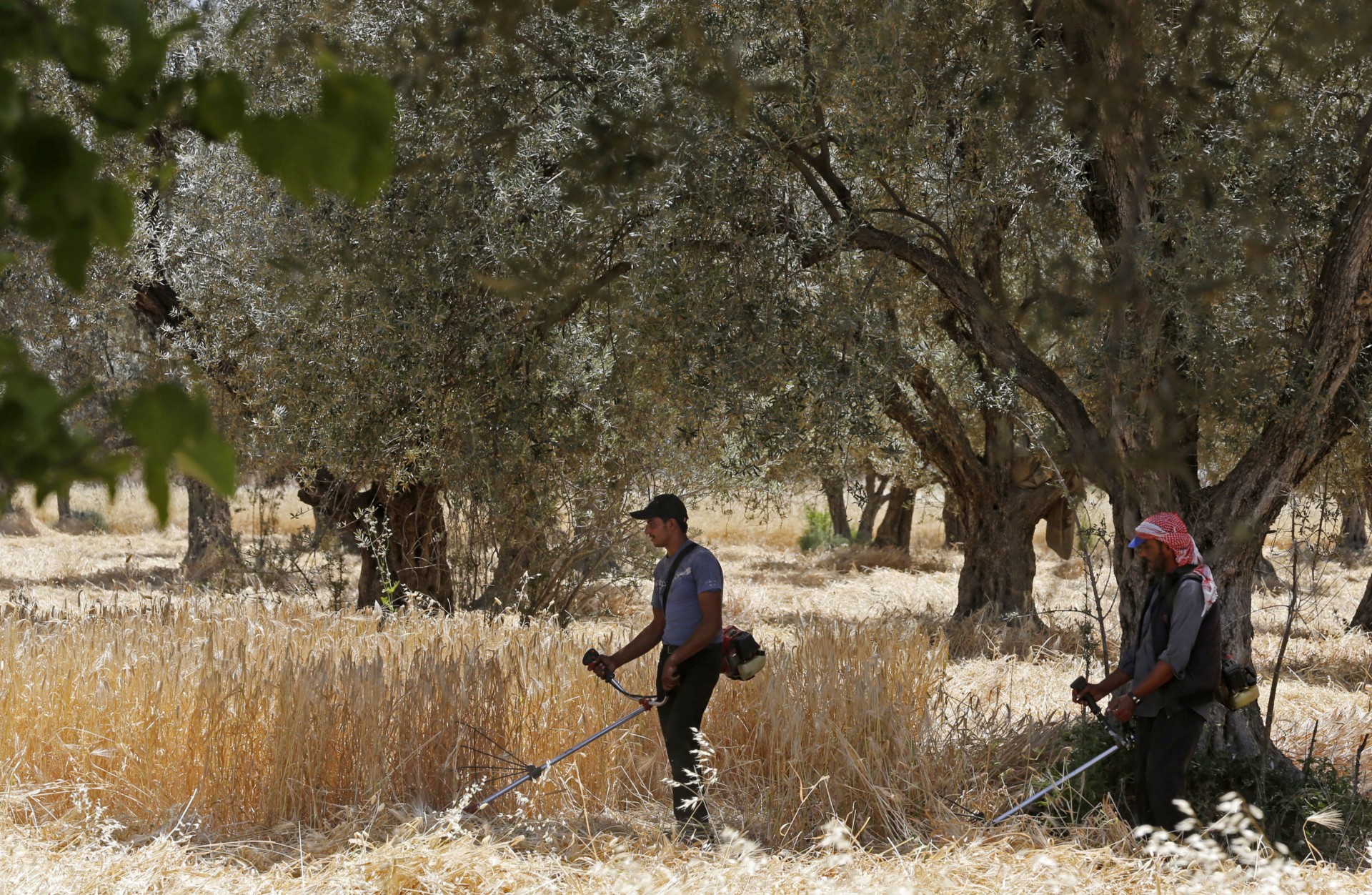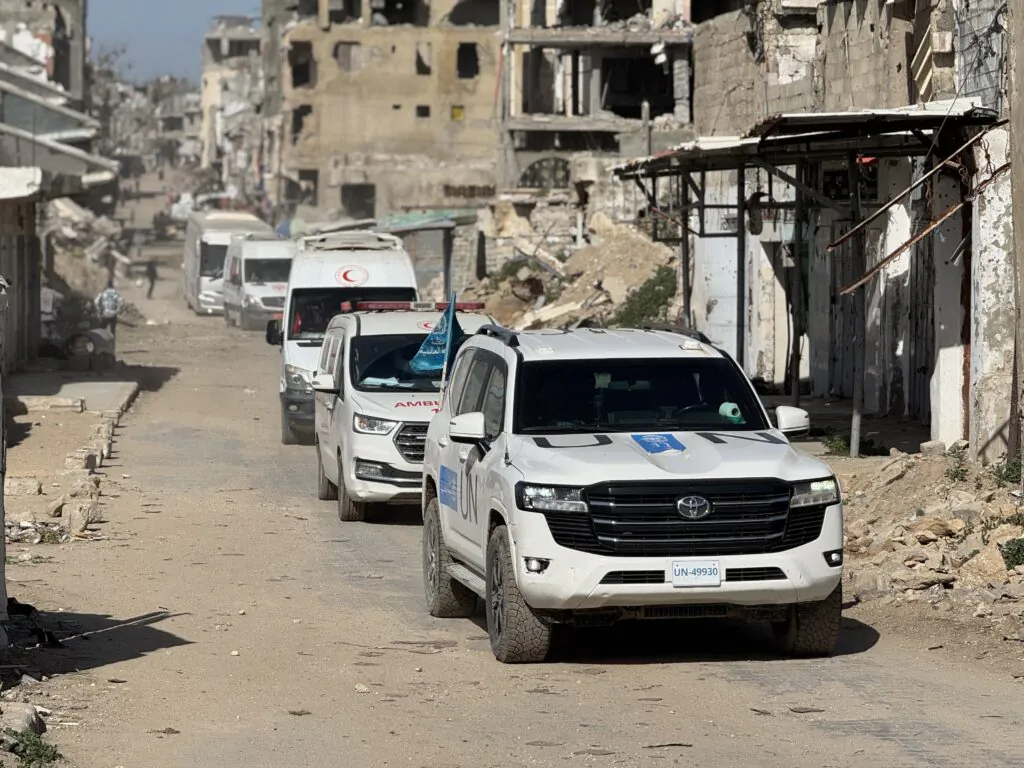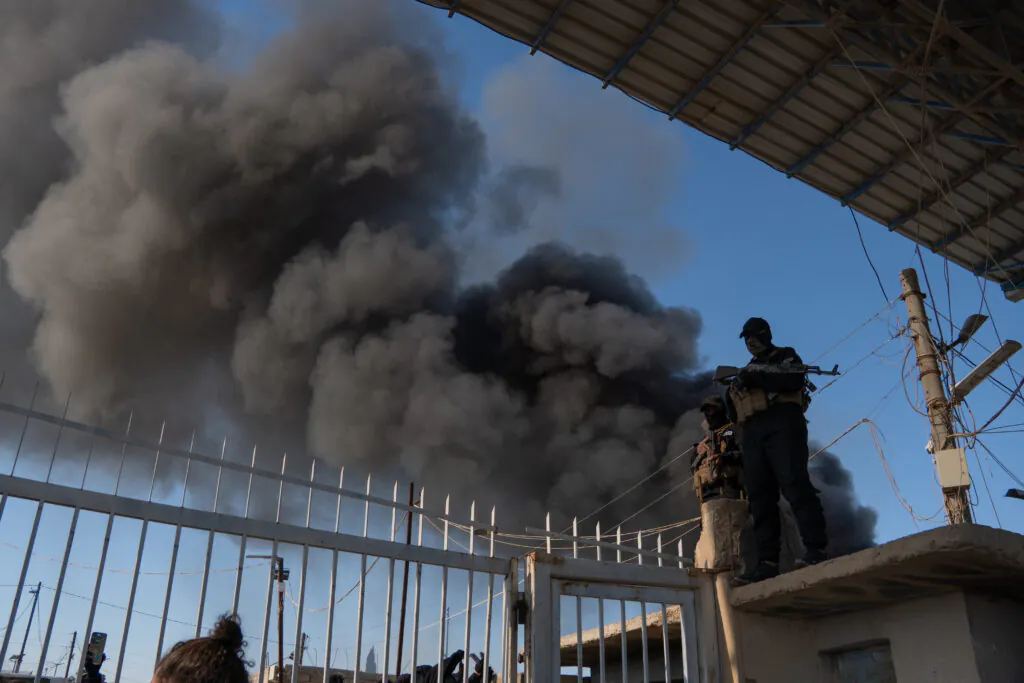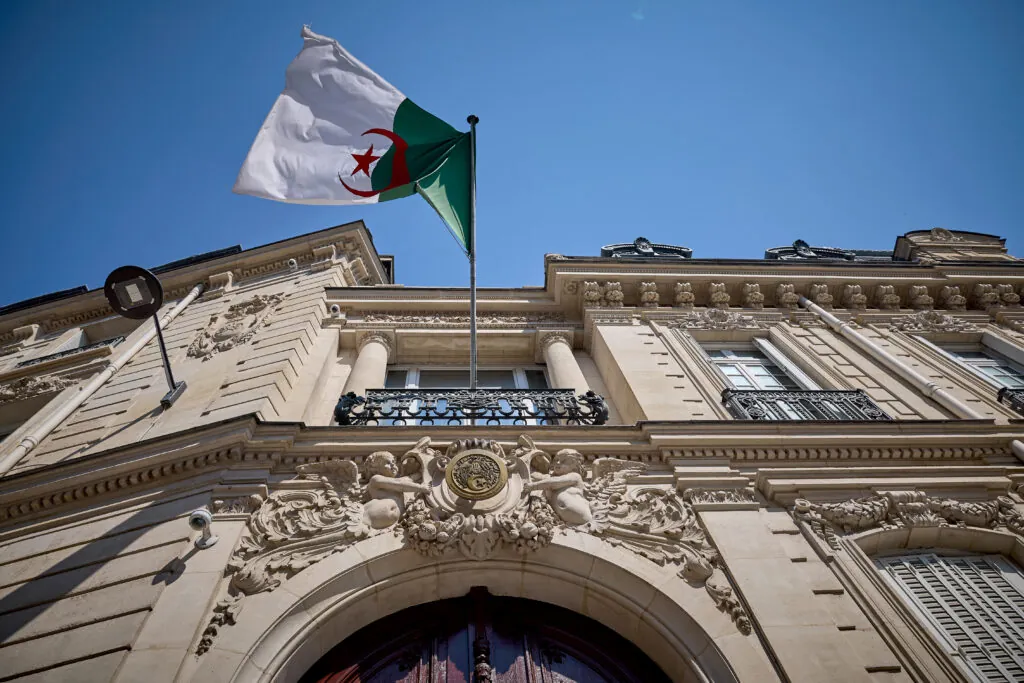
Kneel and Starve: Under the Watchful Eye of the Secret Police, Syrians Go Hungry
A bread crisis has led even Syrians who supported the government (or at least did not oppose it) to lose faith in the state as a source of stability. In response, Damascus has turned to violence and repression as a means of containing the fallout.
Throughout the 10 years of crisis in Syria, the Assad regime enjoyed the support, or at least the acquiescence, of segments of society that prioritized stability and a steady supply of services above all else. But the country now is in the midst of an economic collapse, largely stemming from years of war and the economic meltdown next door in Lebanon, that is crippling the Syrian state’s ability to provide even the most basic of services to the citizenry. As prices of food skyrocket, the state is no longer able to provide even subsidized bread on which Syrians have come to increasingly rely throughout the war. Unable to fill their stomachs, Syrians are increasingly going hungry. More than ever before since Bashar al-Assad inherited power in 2000, his regime is relying on repression and terror to keep the immiserated population silenced, while regime cronies and those linked to the secret police profit from the crippling shortages.
The line for bread is already long at 6:30 a.m., when Ghiyath* approaches the state bakery in his town in the Damascus countryside. He gets in line and waits for over two hours to purchase subsidized bread from a state bakery, then heads to work at the regional council. This has been his daily routine for months. “I feel an internal struggle. I think about how I can survive on this small salary,” Ghiyath explains, describing his thoughts while he waits in the cold. “Sometimes tears come streaming down my eyes without me noticing. I feel helpless, and I start to think, I have to do something. I have to act. Enough with this endless humiliation.” Ghiyath is one of millions of Syrians now queuing daily in areas under regime control for bread, sugar, rice, diesel and cooking gas, suffering from shortages of basic necessities and a sharp rise in food prices.

As hunger worsens, regime cronies continue to flaunt their wealth. Yet the millions of Syrians residing under regime control have remained quiet. Despite expectations by some in Syria, Syrians grit their teeth and continue to bear the unbearable. Ghiyath explains why: “The moment I start thinking [about revolting], the images of Caesar appear before me,” referring to tens of thousands of photos smuggled out of Syria by a defector known as Caesar who documented over 11,000 political prisoners killed by torture, disease, or starvation in regime prisons. “It’s as if each photo is etched in my memory, how frail their bodies looked, where they were wounded. I imagine what would happen if I screamed, cursed the regime, and revolted. They would arrest me, maybe even take my wife and rape and torture her in front of me.” This brings any thoughts of revolting to an end. Instead, to relieve the pain, he sometimes laughs, then cries, then talks to himself, quietly, so others don’t hear what’s on his mind. He’s not the only one, Ghiyath explains: “People are not crazy, but they talk to themselves in line. Better than speaking up and ending up tortured in detention.”
An Unprecedented Bread Crisis
The shortages are hitting the population hard because bread is the cheapest source of calories, which Syrians have increasingly come to rely on as their economic situation has deteriorated throughout the war. Bread was always a central staple of the Syrian diet, but the rise in the prices of meat, eggs, dairy products, fruits, vegetables, and even cheap grains such as rice and bulgur, led Syrians to rely even more heavily on bread to stave off hunger. Over the past year, according to U.N. World Food Programme data, prices of basic food items rose by 247 percent in Syria, stemming from the economic crisis in neighboring Lebanon and the rapid depreciation of the Syrian currency (currently trading at 3,300 lira for one dollar on the black market). In 2019 – before the hikes in prices of goods in 2020 and 2021– the United Nations estimated that 83 percent of Syrians lived below the poverty line. According to the last U.N. World Food Programme assessment, which covered the period until June 2020, before additional price hikes and renewed bread shortages, almost half of the country’s population was food insecure.

Syria’s latest bread crisis started in September, worryingly close to the end of the harvest season, indicating a significant shortage at a time of year when wheat should still be plentiful. In contrast, the previous bread crisis, the first of its kind in areas under regime control, started in March 2020, shortly before the start of the June harvest, when stocks of wheat are expected to be relatively depleted. Subsidized bread is simply not available in sufficient quantities across the country. The availability of bread varies from one area to another, with the crisis being particularly acute in Damascus and its countryside, likely due to the large number of residents in the area, and Daraa in the south. In these regions, many bakeries are nowopen only a few days per week due to wheat shortages.
The initial shortage led the Syrian government to announce the imposition of quotas for the sale of bread. Those quotas were unevenly applied but were further tightened following the outbreak of the current crisis. Under the current system, the average quota per person (which varies slightly based on family size) is 3.5 pita breads daily that ought to weigh 650 grams, amounting to about 960 calories. However, the Syrian state is unable to provide even this reduced quota. “I haven’t been able to obtain bread for about a week,” said Maryam, a displaced student living in Jaramana, on the outskirts of Damascus. “I wait in line for four or five hours and return empty-handed.” When she has to attend courses, she recruits her mother, who has cancer, to stand in line instead, “and when I’m done with the courses, I return to take her place. Every day there are fights in line because of the overcrowding.”

Causes of the Bread Crisis
The shortage of subsidized bread stems from a combination of factors, the main one being that most wheat is grown in areas outside of the regime’s control. Over 70 percent of the areas planted with wheat in 2020 were under the control of the Syrian Democratic Forces (SDF) in northeast Syria. Areas under rebel and Turkish control also have wheat fields, and thus the regime is left with only about 20 percent of the country’s harvest. On top of that, the SDF, the Salvation Government linked to Islamist rebel group Hayat Tahrir a-Sham that governs Idlib, and Turkish companies have all offered farmers higher prices to sell their wheat, dissuading sale to the regime.
Even the little wheat the Syrian government is able to purchase often gets diverted. The shortage of bread and flour and the high price they can fetch on the black market (5-10 times the subsidized price) encourage state employees, most of whose salaries are now worth less than $20 per month, to steal wheat and bread and sell it on the black market. Laith, a photographer living in Damascus, said that “the allocations of wheat to each bakery are often sold off [by individuals] cooperating with the members of the Ministry of Supply” – the commonly used and prior name of the Ministry of Internal Trade and Consumer Protection – “and members of the mukhabarat charged with surveilling the bakeries.”
Corruption also facilitates the sale even of wheat grown in areas under regime control to actors other than the state’s establishment for trade of grain (Hoboob), which supplies state bakeries. The price offered by the regime, 400,000 Syrian Lira per metric ton (about $150 during the harvest period in August), is also below the international market price (around $200 per metric ton during the harvest). Officially, farmers are obligated to sell their grain to the state if they bought seeds and fertilizer from it, “but the committee to evaluate the volume of production takes bribes” in exchange for determining that the farmers produced less, said Bassem, a farmer growing wheat in Salamiya, the countryside of Hamah. As a result, “farmers [were] able to get away with selling about 70 percent of the grain on the free market and the rest to the state,” he estimated.
The smuggling of Syria’s domestically produced wheat is exacerbating the country’s shortage and rise in food prices. Most of the wheat grown in Syria is durum wheat, suitable for making pasta but too coarse for producing bread. Several sources, including an SNA (Syrian National Army) military police officer, a Syrian trader working in southern Turkey, and Bassem, said much of this grain is smuggled to Turkey via traders with ties to the Syrian regime. The SNA officer said he personally participated in stopping grain trucks, but only to search them for hidden explosives before allowing them to proceed. According to the Syrian businessman, the grain is then sold to Turkish traders who purchase soft-milled flour for about 1,700 Turkish lira per metric ton ($230) and durum wheat for 1,800 Turkish lira per metric ton ($244). The durum wheat is then sold to factories producing pasta in Turkey.
Since the start of the uprising, the regime has had to rely on imports to make up for the shortfall in wheat, but such purchases require access to foreign currency, which the regime increasingly lacks. In 2019, the regime was attempting to carry out peculiar swap deals of durum wheat in exchange for soft-milled wheat required for producing bread, indicating a crunch in foreign currency. The shortage was exacerbated by the October 2019 banking crisis in Lebanon that made tens of billions of dollars held in accounts of Syrian and Lebanese companies and individuals no longer accessible. The regime used some of those companies to purchase wheat abroad, and now they struggle to find the cash. The global rise in the prices of wheat is also harming Syria: Six deals that were successfully concluded with Russian suppliers fell through in December 2020 after they became unprofitable for the sellers. Russia donated 100,000 metric tons of wheat to Syria in 2020 and has not made any new pledges since.
The shortage of fuel in Syria, exacerbated by the regime’s financial troubles and the 2018 tightening of U.S. sanctions on Iranian energy imports, is also contributing to the bread shortage by disrupting the operation of state bakeries. Hareth, a former rebel commander who oversaw the surrender of his town to the regime in 2018, said that “the bakery runs on electricity, and it cuts out, so wheat is moved from one bakery to another, giving opportunities to steal. Some bakeries run generators, but they require diesel, and there’s no diesel on the market.”

State Atrophy
Faced with empty state coffers and unable to halt the spiraling inflation, the regime is increasingly struggling to provide even for communities deemed loyal. Severe shortages of bread are occurring in towns and cities whose sons died in the thousands in the ranks of the Syrian Army and regime militias such as Qomhaneh and Tartous. The circle of loyalists who continue to enjoy a decent standard of living is shrinking. Basics, including sufficient bread, are increasingly available only to those well connected to the coercive apparatuses or state employees in key positions. Abdul Rahman, who works for the state’s water authority in Aleppo city, provides an example: “My neighbor is an officer in Political Security [a mukhabarat branch]. A bread distributor knocks on his door every morning and gives him his bread and insists on not taking any money.”
As in the case of other shortages in Syria, regime agents are profiting off the scarcity, specifically members of the mukhabarat and employees of bakeries and state institutions in charge of purchasing and ferrying wheat. Hareth, in the countryside of Damascus, described how subsidized bread stolen from state-run bakeries is sold out in the open by regime informants, for five to 12 times the official price, depending on how bad the shortage is.“The person distributing the bread to them is an officer in the Air Force Intelligence,” said Hareth, adding, “He enters the bakery and then carries the bags of bread to his car. More so, he insolently asks people who are waiting in line to help him carry the bags. You cannot imagine how painful and humiliating this sight is.”
The shortage of bread is just one of the many deprivations Syrians are forced to navigate. Food is increasingly unaffordable, heating sources are expensive on the black market and in very short supply through the state’s subsidy system, electricity cuts out at most hours of the day, as does water, all while COVID-19 is raging across the country. Laith, the photographer living in Damascus, put it this way, “Life in Damascus has become a series of crises, and when these crises worsen, they make life into just a race to obtain the most basic necessities of life. People can think of nothing else.”
Increasingly, Syrians who once supported Assad and quietists who acquiesced to it no longer view the regime as a guarantor of stability. The Syrian state’s inability to meet the increasingly minimal standards demanded by the population, coupled with the widespread corruption and predation of the regime’s coercive apparatus, have led to this shift. The quietists, known as ramadiyeen (gray people), are neither regime supporters nor opponents. They are characterized by hopes of returning to pre-2011 days and a desire for stability and steady provision of services above all else, forgoing demands for political change. “There are no more ramadiyeen left. Everyone hates the regime except the small group of people profiting from it,” said Maha, a retired state employee living near Qardaha, the Assad family’s ancestral home.
The disillusioned regime supporters and fence-sitters view the unprecedented deterioration in living standards as a violation of the informal social contract in Syria, whereby the regime provides basic services and steady salaries to a bloated public sector in return for political quiescence. This is reflected, for example, in expressions of longing for the days of Hafez al-Assad and invocation of his vow that any disruption to the provision of cheap subsidized bread is a “red line.”
Alternatives to the Assad regime’s rule seem increasingly attractive to Syrians, and not just to wheat farmers who prefer to sell their grain to actors other than the state.The thinning of the ranks of regime supporters and fence-sitters manifests mostly in complaining, online and offline, but in some cases leads to real-life outcomes. Rather than contest the regime, or try to escape abroad, which requires prohibitively expensive smuggling, some Syrians are escaping to areas under SDF control. SDF members stationed in Raqqah and Deir ez-Zor describe a growing stream of defections into the ranks of the SDF from regime militias and Syrian Army units stationed in northeast Syria due to the better salaries offered by the SDF. The past year has also seen a steady stream of families, particularly from regime-held Deir ez-Zor, moving to SDF areas due to better living conditions. “The Fourth Division [of the Syrian Army] are leaving people with nothing. They’re taking a cut from everything,” said Aboud, a journalist living in regime-held Deir ez-Zor, referring to the “taxes” the division, commanded by Assad’s brother, imposes on the population. “In al-Jazeera [SDF areas], there are jobs,” said Aboud. Those leaving regime-held Deir ez-Zor are not supporters of the opposition but mostly Syrian state employees who remained tethered to the regime through the war and can simply no longer survive on their salaries.
With the breakup of the social contract undergirding support for and acquiescence to the regime, Assad is increasingly reliant on violence to remain in power. Despite the unprecedented hardship, only one, tiny protest was documented in areas firmly under regime control, and it expressed devotion to the regime, merely asking for bread. The overwhelming consensus among the dozens of interviewees residing in regime-held areas is that bread riots are unlikely to occur in Syria; the population is too terrified, feels powerless, and does not see the point in protesting. Farouq, a resident of eastern Daraa in which the regime refrains from carrying out arrests due to an agreement sponsored by Russia, explained, “In our town, there are two WhatsApp groups, and people express their frustrations … but only those who are already wanted by the regime, former revolutionaries, dare to curse Assad. The fear of arrest or the rifle is stronger than the fear of hunger.”
To some, surrendering and silently enduring an intolerable situation is all they can do. Maryam, living in Jaramana, said, “The people have given up hope that complaints will change anything and are just acclimating to the situation.”
The regime fears the emergence of protests, even ones merely demanding bread, ensuring no mention of disturbances in regime areas reach the public through state-run media or online. But even if protests break out, Assad can continue to rely on the mukhabarat’s agents to suppress them – after all, the leaders and foot soldiers of the secret police are deeply invested in a regime that provides them opportunities for illicit enrichment at the expense of the wider Syrian population. Jamil, a father of two living in Houleh, northern Homs, described the fear paralyzing Syrians: “People remain silent and accept injustice. They see their children go hungry, and they are powerless to do anything.” Referring to the terror established in Syria after Assad’s father, Hafez al-Assad, grabbed power through a coup in 1970, he said, “This tight grip of the mukhabarat is now over 50 years old, as is the fear of it. We inherited it from the era of the father to the son.” Syria is witnessing state atrophy, yet the regime lives on, Jamil said. “There is no state. There are no institutions. It is just the tight security grip that keeps the regime in power. This grip is the nightmare that haunts Syrians.”
In the early months of the Syrian uprising, pro-regime militiamen infamously graffitied “kneel or starve” on walls in rebellious towns they placed under siege while shelling them. The regime and its henchmen were always clear about what life under Assad entails: obediently bowing down before authority. While millions of Syrians participated in the peaceful anti-regime protests of 2011, millions more decided not to, often due to fear or a desire for stability. A decade later, amid state disintegration, those who have been compelled to kneel are now struggling to buy enough bread to stave off hunger. Meanwhile, those who forced the population to its knees are once again seeing the latest crisis as an opportunity to make a profit.
*All names of Syrians were altered to protect them from reprisal.
The views expressed in this article are those of the author and not an official policy or position of the New Lines Institute.




